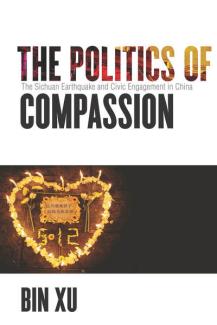Event

Issues in Contemporary East Asia Colloquium Series
The 2008 Sichuan earthquake killed 87,000 people and left 5 million homeless. In response to the devastation, an unprecedented wave of volunteers and civic associations streamed into Sichuan to offer help. The Politics of Compassion examines how civically engaged citizens acted on the ground, how they understood the meaning of their actions, and how the political climate shaped their actions and understandings. Using extensive data from interviews, observations, and textual materials, Bin Xu shows that the large-scale civic engagement was not just a natural outpouring of compassion, but also a complex social process, both enabled and constrained by the authoritarian political context. While volunteers expressed their sympathy toward the affected people's suffering, many avoided explicitly talking about the causes of the suffering—particularly in the case of the collapse of thousands of schools. Xu shows that this silence and apathy is explained by a general inability to discuss politically sensitive issues while living in a repressive state. This book is a powerful account of how the widespread death and suffering caused by the earthquake illuminates the moral-political dilemma faced by Chinese citizens and provides a window into the world of civic engagement in contemporary China.
Book Reviews
"Bin Xu's analytic insights into "the politics of compassion" are acute, but his account never erases the personal and human. The result is riveting, provocative, and ultimately heart breaking." (Deborah Davis Yale University)
"In a field heavily influenced by institutional and organizational analysis, Bin Xu's book foregrounds action, meaning, and context in the formation of Chinese civil society. Analyzing the practices of civic engagement following the Sichuan earthquake in 2008, Xu tells a rich and moving story of both apathy and moral sentiments, powerlessness and agency. The result is a refreshing, cultural-sociological perspective on the politics of compassion and civil society in China." (Guobin Yang University of Pennsylvania)
"A riveting account of the aftermath of the Sichuan earthquake. All of the different types of actors, both within the state and in society, that constitute "civil society" in China are here brought to life and depicted in their complex interactions and negotiations. The Politics of Compassion should be required reading for all students of contemporary Chinese society and politics, as well as on state-society relations in general." (David A. Palmer The University of Hong Kong)
Bin Xu is an Assistant Professor in the Department of Sociology at Emory University. Bin Xu’s research interests lie at the intersection of politics and culture. His book The Politics of Compassion: The Sichuan Earthquake and Civic Engagement in China (Stanford University Press, 2017) examines Chinese citizens participated in the rescue and relief efforts after the devastating Sichuan earthquake and how the political context shaped their actions and meanings. He is currently writing a book and a few related articles on the collective memory of China’s “educated youth” (zhiqing) generation—the 17 million Chinese youth sent down to the countryside in the 1960s and 1970s. His research has appeared in leading sociological and China studies journals, including Theory&Society, Sociological Theory, Social Problems, Social Psychology Quarterly, China Quarterly, and The China Journal.